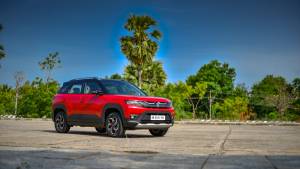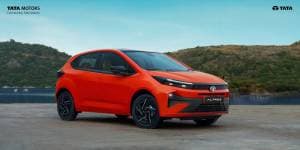Now in 3D
It never really had much of a shot at success, the Passat. It may be one of, if not the most important model in the VW range, but in India it assumed the role of the guinea pig, thrust with the unenviable task of testing the waters while VW sorted out its act. Not that there was anything wrong with the car per se. In fact when we first tested it we hailed it as the pick of the segment, but when launched at the fag end of 2007 there were fewer VW dealers than fingers on your hand. Barely a year later came the first change the PD (pumpe duse) diesel being dumped in favour of the common-rail unit. Which itself lasted only a year till BS IV emission norms came into force and both diesel engine and DSG auto 'box made way for the 1.8-litre TSI turbo petrol (which debuted earlier on the Superb) and a manual. And so while 15 million Passats have been sold worldwide, in India, you'd have to be really brave to count yourself among them.
The VW of 2011 though is a very different beast to the VW of 2007. Product planners have learnt their lessons, dealers have been added and effective communication has built up a strong brand. Heck, they've even begun cricket advertising, the surest sign of being indigenised. And that most pressing of all issues pricing has been addressed. Four years after the Passat came to India this all-new Passat carries the same sticker price while being improved upon in every area. This does not make it any cheaper than its main rivals the Skoda Superb and Honda Accord but it's sure to go a long way into making a serious dent in their volumes.
DESIGN
Volkswagen calls this the seventh-generation Passat but in reality this is a heavily re-skinned sixth-gen Passat. The platform is the same (of course with detail refinements) and dimensions remain identical except for the length going up marginally by 4mm. Visually though there isn't anything in common with the outgoing model and except for the roof every single panel is new. Keeping in step with the new VW design language, the Passat borrows so heavily from the recently face-lifted Phaeton flagship that a casual observer will have difficulty telling one from the other. Sharp lines and creases take the place of soft contours and if you thought the large chrome goatee grille of the earlier car was a bit much, well, the chrome quotient gets ratcheted a couple of notches. And all that detailing serves another purpose, the bonnet creases and the chrome strips notably those at the lip of the front and rear bumpers visually stretch out the car making it look lower and wider.
Subtlety then isn't the new Passat's forte. But, mind you, that is far from being a negative markets like ours love shouty, in-your-face cars and the Passat works brilliantly. In black with all that chrome it'll look sinister and the cherry on top are the striking daytime running LEDs in the headlamps that give it a very posh and upmarket air.
On visual appeal then the Passat kicks the ball out of the park. Its closest rival is the Honda Accord which was face-lifted barely a month ago. Not that you'd notice, the only change being more chrome on the grille. However there always was a hint of aggression to the Accord, particularly its nose, and it has aged well. Slap on the optional sports body kit and you have the only (remotely) sporty looking car in this test.
The Superb on the other hand eschews all forms of visual aggression, burrowing its own little and wantonly quirky furrow. Like with all matters concerning style it divides opinion I for one always maintained the nose looks awkward and the stretched cabin ungainly but then that's me and to be fair I know of many who quite like it.
INTERIORS
Step inside the Passat and there's an air of familiarity, a been-there-done-that feel to the design, the controls, everything. But let that not undermine the fabulously well engineered cabin whose material quality and finish set new standards for this class (besting the benchmark set by the outgoing Passat). By resisting the urge to splash it with a bucket of beige the cabin looks and feels overwhelmingly posh and upmarket. Every surface that you'd touch is swathed in soft-touch plastics, every control operates with a well damped precision and the (great looking) seats which feel a little firm on initial impression actually offer great support over long drives. Interior space remains unchanged and is commodious while refinement and noise suppression are even better. Thicker glass is used for the windscreen which has better sound insulation properties and new engine mounts for the diesel engine further cut NVH.
Then there's a feature count to rival premium luxury cars. Obviously there's dual zone climate control, eight airbags, ABS and ESP stability control but on top of that there is fatigue detection (which studies the driving pattern for 15 minutes and sounds an audible warning when inputs get erratic), xenon lights with cornering function, touchscreen multimedia interface, even seat warmers (no practical use in India) and coolers (a must for India). And the big talking point, BlueMotion suite of technologies (see separate box) and park assist which automatically reverse parks the car into parallel and perpendicular slots. There's everything you could possibly want which is why I find it strange that there's no navigation functionality which you will find in the IPL edition Vento (which shares the same basic multimedia interface unit).
In comparison the Accord's cabin feels depressingly low key and is completely overshadowed. The material quality isn't anywhere close, the plastics are hard and brittle to touch, the design is old-school with a forest of switches on the central console, the info screen uses outdated calculator fonts and doesn't show much information, there isn't a full-fledged trip computer, no Bluetooth connectivity, not even audio controls on the steering wheel (but you will find that under the rear armrest). We're in no way inferring that the cabin is poorly built that isn't a charge you can level at any Honda but there's no sense of occasion and on perceived quality the Honda trails way behind the Volkswagen.
All's not lost though and the Accord makes good with a very high comfort quotient. The seats, both front and rear, are hugely comfortable and the gathered leather is a nice luxurious touch. Space is cavernous and it has the widest cabin with the most shoulder room. Rear leg room is also enormous and you can't imagine a more accommodating cabin. Until you sit in the Superb.
The Skoda's platform is essentially that of the Passat with the wheelbase stretched by 50mm, all of which goes into liberating so much rear leg room that it rivals long wheelbase luxury saloons. It's ridiculously spacious at the back, perfect for stretching out after a long day. The interiors also feel better built than the Accord (more airbags too, eight to the Accord's six), the soft touch plastics are great to touch and there is considerably more design flair. Purely on space the Superb has the measure of the Passat (so too does the Accord for that matter) but when you take the overall cabin into account, the quality, worksmanship, materials and design flair the Passat wins.
DYNAMICS
The PQ46 platform of the Passat remains unchanged with MacPherson struts up front and a multi-link axle at the rear. However there have been detail refinements including lighter suspension components that result in an even better ride quality than before. There's an added suppleness to ride and excellent compliance over poor roads and the Passat is nothing if not supremely comfortable over all kinds of road surfaces. In fact the faster she goes the better the ride quality becomes. And despite this platform being derived from the Golf hatchback, the Passat displays very mature and sophisticated road manners; it feels like a big and expensive car.
And it doesn't come at the cost of handling which remains impressively flat and composed even at silly speeds. There's very good body control and surprisingly little roll, excellent grip levels and a keen desire to resist understeer. The steering is accurate and well weighted and it all adds up to a fast car that can be driven very fast without getting into any kind of trouble.
Trouble though is there's precious little driver involvement to be had. You steer and the car turns; accelerate and she goes. Period.
You never feel like you're part of the action, never will you let out a whoop of delight. A similarly priced BMW 3 Series is a far more engaging tool for the keen driver (though it can't hope to come anywhere close to the Passat's comfort levels). What the Passat is, is an effective point to point tool to ferry people quickly, comfortably and with minimal fuss.
Surprisingly though in this bunch the Passat sets the dynamic benchmark. While the Superb also displays pretty good road manners and surprising agility for its size it doesn't resist understeer as keenly as the Passat and when pushed hard it does have more body roll. No complaints on the ride quality front and the Superb remains as composed and as plush as the Passat.
Which leaves us with the Accord that was designed and built for America the land of no corners. Result is the Honda turns into a tyre squealing mess at the first corner, rolling alarmingly and understeering with determination. So you jump into the back seat, firmly instruct the person behind the wheel to drive at a relaxed pace and soak in the Accord's terrific ride quality. While the Passat might have good low speed ride the Accord goes one better completely banishing all those little ripples that filter into the VW's cabin. Plus those soft seats that you sink into heightens the sense of serenity and luxury. A warning though the soft suspension can result in the Accord pitching and wallowing over undulating roads so the driver better keep a firm check on his right foot lest passengers feel sick.
PERFORMANCE
Finally brand Volkswagen asserts its dominance in India. Up until now Skoda got the first pick of new powerplants which then made their way to VWs the 2.0-litre common-rail diesel and 1.8-litre TSI petrol were first seen on the Superb, you could get a DSG gearbox in the Superb while for the last year the Passat had to make do with only a manual, even the Laura had a higher output diesel compared to the Jetta. No longer. While it is still the 2.0-litre diesel under the hood of the new Passat, it is in a 170PS state of tune, compared to the Superb's 141PS. It's the only engine on offer (no petrol for now) and can be had with the 6-speed DSG twin-clutch automatic or 6-speed manual (on the base Trendline which will be introduced in a few months).
As you'd expect with 170PS the Passat has crackling acceleration: 0-100kmph takes 9.22 seconds which is way quicker than the Superb's 12.0 seconds while the top speed is 213kmph to the Superb's 202kmph. With 350Nm of torque (to the Superb's 320Nm) it also has a meatier bottom end and greater engine flexibility. And with the new engine mounts and better sound insulation the Passat also comes across as more refined with barely any diesel engine clatter filtering into the cabin.
The Accord makes do with only a petrol engine (which is its biggest problem if we're being honest), a 2.4-litre iVTEC making 180PS of power and 222Nm of torque. Obviously on the refinement and smoothness front it is a no contest in the Accord's favour but if you were expecting the petrol to outperform the diesels you'd be surprised. Mated to the 5-speed auto the Accord manages a 0-100kmph time of 9.93 seconds while the top speed is 198kmph. It's actually the gearbox playing truant here and sapping the engine of performance, a complete contrast to the advanced DSG twin-clutch automatics that deliver near instantaneous shifts up and down gears while not affecting performance negatively.
The Accord also loses out on fuel efficiency with an overall figure of 8.9kmpl. Plus its petrol we're talking here. Both the diesels deliver almost identical efficiency figures, the Passat slightly ahead on the highway runs, the Superb nosing ahead in the City. The Superb's engine is in fact slightly more efficient but thanks to the Passat's BlueMotion technologies particularly stop-start (which kicked in 16 times on our city run) the overall figure of 13.8kmpl was the same as the Skoda.
VERDICT
It's all too easy to write off the Honda: the interiors don't look or feel remarkable, it doesn't handle, there's no diesel engine and it's no cheaper than the others. But that's overlooking one crucial point fitness of purpose. Cars of this segment are, over and above everything else, required to be comfortable and the Accord is properly decadent on this front. To drive she's completely effortless (at the expense of steering feel but still), the seats are the most comfy of the lot (particularly over a typically short city commute), the low speed ride is amazing and the seat aren't seats they're sofas. The Accord still makes a strong case for itself, but the only problem is the competition has moved the game on.
So if the Accord has a sofa at the rear the Superb goes one better by offering leg room akin to a long wheel base S-Class. The low speed ride might be a smidgen stiffer (you probably won't even notice it) but its high speed ride, stability, composure and handling are way superior. The interiors are similarly way superior, there's far more equipment and you have a choice of both petrol and diesel engines. Starting at Rs 21.16 lakh for the 1.8-litre turbo-petrol (which is a quicker and more efficient engine to the Accord's 2.4) with a manual gearbox the Superb is also the cheapest car in this segment offering, by far, the best value-for-money.
In fact it's such great value that I see no sense (unless you operate a taxi fleet or rake in some massive miles every month) in stretching to Rs 26.17 lakh for the diesel when the automatic manual can be had for Rs 22.91 lakh.
But if you have your heart set on a diesel there's not a single reason why you shouldn't stretch yourself by a lakh and spend Rs 27.33 lakh on the similarly equipped Comfortline Passat (two lakh more and you get parking assist on the Highline). The engine is more powerful and responsive, the flashy styling will turn more heads, the interiors are more up market, refinement is better, dynamics are better. In every single respect (save for rear leg room which the Superb has in overabundance) the Passat is the better car and thus wins this test.

Starts Rs 41.7 Lakhs
1998cc
Automatic
190
400
16.13 Kmpl
-NA-
2400cc
Automatic
-NA-
222
12.88 Kmpl
Starts Rs 31.99 Lakhs
1798cc
Manual
190
250
13.1 Kmpl
Starts Rs 30.2 Lakhs
2000cc
Automatic
177
350
16 Kmpl











